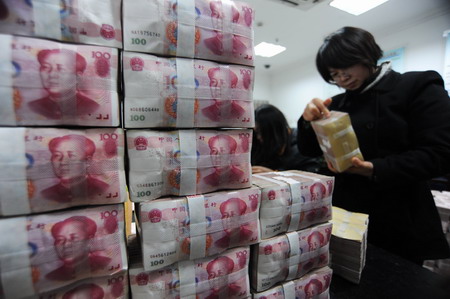Money
Head of IMF urges greater role for yuan
By Lesley Wroughton (China Daily)
Updated: 2011-02-12 11:02
 |
Large Medium Small |
|
 |
|
An employee counts yuan notes at a branch of China Construction Bank in Haian, Jiangsu province. [Photo / China Daily] |
Dominique Strauss-Kahn wants reform of global monetary system
WASHINGTON - The Managing Director of the International Monetary Fund (IMF), Dominique Strauss-Kahn, said on Thursday that the Chinese yuan should be given a greater role within a restructured international monetary system.
Strauss-Kahn, speaking at the IMF's headquarters in Washington DC, said that adding emerging market countries' currencies such as the yuan to a basket of currencies that the IMF administers would benefit the global system and create more stability.
He warned that without adjustments to the global monetary system the world could be sowing the seeds of the next crisis, pointing to widening economic imbalances, large and volatile capital flows, exchange rate pressures and rapidly growing excess reserves. Strauss-Kahn's remarks about the yuan do not mark a policy shift for the IMF, which has always urged more participation by China in the world economy, but it does expand on the organization's stance.
The timing of the statement was significant because it came ahead of next week's Paris meeting of finance chiefs from the Group of 20 (G20) developed and developing nations.
Strauss-Kahn said he also saw a greater role for the IMF's Special Drawing Right (SDR) as a unit of account, but said such a move would take time and a great deal of international cooperation to make it work.
The SDR is composed of the dollar, sterling, euro and yen.
"Increasing the role of the SDR would clearly require a major leap in international policy coordination," Strauss-Kahn said. "For this reason, I expect the global reserve asset system to evolve only gradually, and along with changes in the global economy."
He said overhauling the global monetary system could bolster the economic recovery and help avoid future crises.
| ||||
"In my opinion, reforms to the international monetary system that help us get to the root of these imbalances could both bolster the recovery and strengthen the system's ability to prevent future crises," Strauss-Kahn said.
But bringing the yuan into the SDR will not be simple.
One of the drawbacks is that the yuan is not freely traded, but Beijing has been expanding a pilot program to encourage use of its currency in cross-border trade in what economists say is part of a strategy to raise the currency's profile.
The SDR is not itself a currency but an IMF accounting unit.
It is only used as a reserve asset by central banks and is not available to the private sector.
The IMF's board was cautious about giving the SDR a greater role saying it "should not substitute for the continuing efforts to strengthen the international monetary system's stability".
Still, members acknowledged that "an enhanced role for the SDR could potentially contribute to the long-term stability" of the global monetary system.
An IMF paper released alongside Strauss-Kahn's speech said the US dollar would remain the most important global reserve currency "for the foreseeable future".
But the paper noted there was a place within the system for the SDR to reduce currency volatility and ensure countries have easier access to foreign-exchange funding during crises. It said that using the SDR to price global trade would provide a buffer from exchange-rate volatility, while the issuance of SDR-denominated bonds could create a potentially new class of reserve assets that could involve the private sector.
Reuters
| 分享按钮 |



